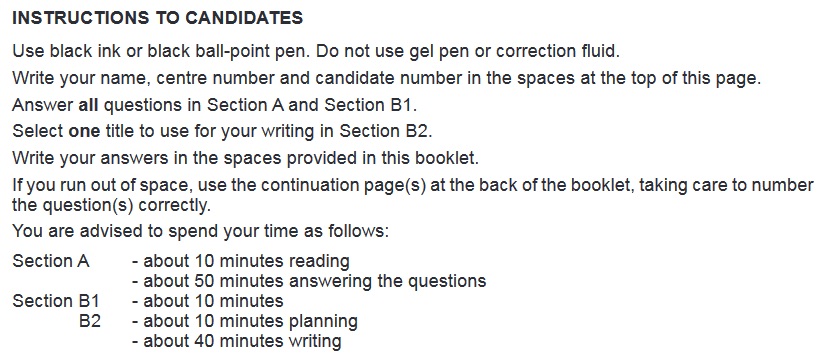Students often ask our tutors many questions about what their exams will be like. The idea of putting all the knowledge learnt in class into a few exams can be daunting, however, it doesn’t have to be.
In this blog we will discuss some exam strategies and how students can manage their time in the exam and achieve the best results available to them.
This can be a tricky question to answer because each subject differs from one another and it also depends on what the question is asking for. Let’s look at some examples from the GCSE English Language Unit 2 paper.


Both questions require the student to read ‘Text A’ and provide facts from the text. Question A1 is looking for only one piece of information: the year when the word “robot” is first used. Question A3, however, requires the student to write two facts that they have learned. Both questions require relatively short answers and therefore they are worth only a few marks. Should the student write more than is required, they will not be awarded extra marks.

Other questions require much longer answers structured similarly to traditional essays. Question A11 below is worth ten marks and it asks the student not only to simply provide the information from the texts they have read but to also analyse and interpret that information cohesively. This type of question may require planning before writing an answer.
Students can roughly judge how much time to spend on questions depending on how many marks are up for grabs. Also, on the front of most exam papers there will be suggestions or advise on how much time students should spend answering each section.

For example:
(English Language Unit 2 GCSE)
This is a good general guideline, and even if the student feels as if they could write more they should move on to the next section when time is up. Quality over quantity is also important.
Our tutors can help students in understanding these guidelines and formulating great answers within the time they are given. In exam halls clocks must be visible to all students, however, it can be useful for a student to have a simple watch (smart watches are not allowed) on their desk to help their time management.
This blog on Exam Strategy and Time management was written by Alek Dul, our English GCSE and A level Tutor.
How to understand exam questions?
A good place to start is for the student to learn the meanings of question command words such as: describe, explain, analyse, discuss, calculate etc… mean. Our tutors show students various question types and help them understand what the command words mean as they can vary from subject to subject. It’s also useful for students to underline and highlight key words of more complex questions. Again, our tutors can teach students what kinds of words are key to understanding a question.
Summary
Students should spend more time on the questions that are worth more marks because examiners expect more from those questions, and they may require planning prior to writing. This doesn’t mean the questions with only a few marks available aren’t important: it simply means not to linger on those shorter questions. Our tutors are able to teach students essential exam question command words, how to formulate plans and answers, and help them understand the examining board’s time management guidelines.